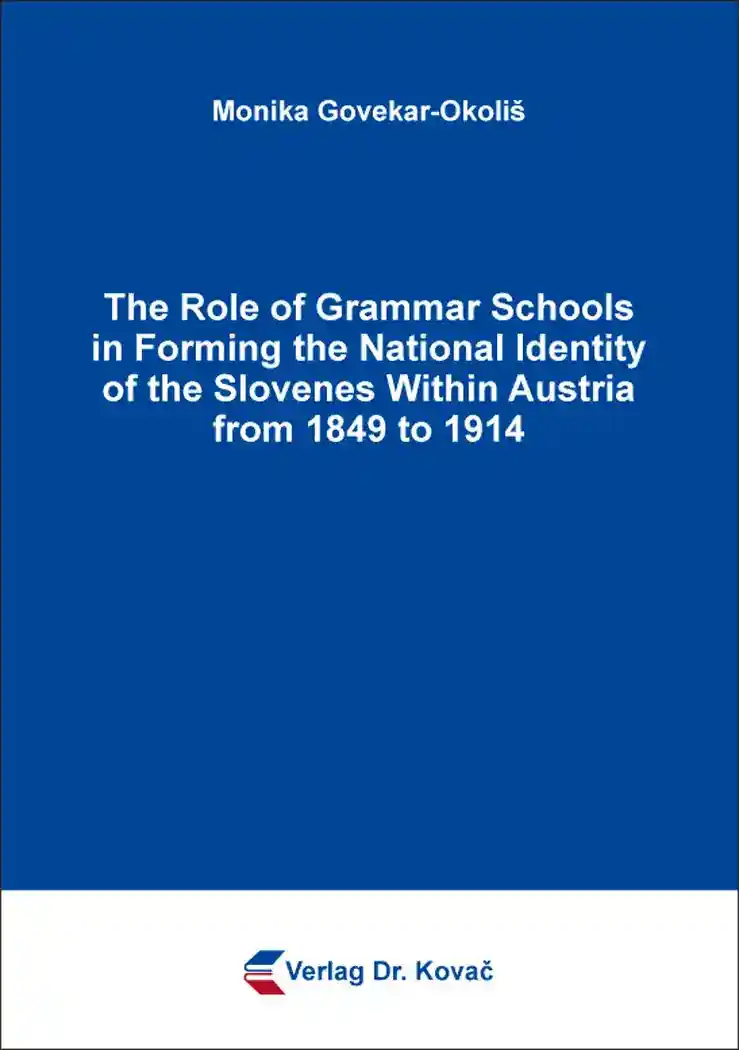Monika Govekar-OkolišThe Role of Grammar Schools in Forming the National Identity of the Slovenes Within Austria from 1849 to 1914
– in englischer Sprache –
EUB. Erziehung – Unterricht – Bildung, volume 182
Hamburg 2017, 186 pages
ISBN 978-3-8300-9598-9 (print) |ISBN 978-3-339-09598-5 (eBook)
About this book deutschenglish
„Monika Govekar-Okoliš, the author of the monograph, shows with feeling and intellectual maturity the destiny of a small nation‘s struggles for its existence and development within a big national structure. More than today, the theme was absolutely topical in the 19th century. Feudal Europe was then being rearranged, including by the very emergence of nation states. Therefore, formation of the national identity was also existentially important for Slovenians, particularly for the education of youth in the public education system.
The author has chosen the grammar school for her narrative as its central mission is to form the spiritual image and identity of youth, including developing the national consciousness which, in the author‘s opinion, is established at two levels: cultural and state-building. A nation remains and is developed as a cultural and political nation when (if), beside cultural identity, it also achieves administrative-political autonomy. The turning point in this development is the year 1848/49 which in Austrian history is referred to as the time ‚of the spring of the nations‘. Many centuries before that, the Slovenians had been developing their own culture, mainly by developing the Slovenian language. The language is the pillar of the nation‘s culture. Without the written word, the nation‘s cultural tradition remains oral; without books, the national language cannot be used as the language for educating the young generations.
The Slovenian nation was searching for its identity within the Hapsburg or Austro-Hungarian monarchy. The fact the German language was the sole official language in the monarchy and the lack of Slovenian textbooks acted as important barriers to introducing Slovenian as the language of instruction in grammar schools.
The first graduates passed their leaving examinations in the Slovenian language only in 1913, with this happening not in an Austrian state grammar school but in a private diocesan one. The centralised state arrangement of education prevented the grammar school as a state school from developing Slovenian-oriented patriotic or homeland and civic education. Nevertheless, tendencies to develop the Slovenian identity, both cultural and political, have never died out among the Slovenian intelligentsia. The author demonstrates that levels of a hidden curriculum were present in the state grammar schools; the formation of a national culture and especially a national political consciousness in the Slovenian state grammar schools in the Slovenian lands of the monarchy is present only in the subversive educational activities of Slovenian-conscious teachers and grammar school pupils.“
From the review by Prof. Dr. Zdenko Medveš
Keywords
BildungCivic educationCultural national identityGeschichteGrammar schoolsNationNation-stateNational educationNationale IdentitätNational movements of grammar school pupilsNationalsprachenPatriotic educationPolitical national identitySlovenian books and textbooksSlovenian grammar school teachersSlovenian language in grammar schoolsSloveniansSlowenienSoziologieIhr Werk im Verlag Dr. Kovač

Möchten Sie Ihre wissenschaftliche Arbeit publizieren? Erfahren Sie mehr über unsere günstigen Konditionen und unseren Service für Autorinnen und Autoren.
